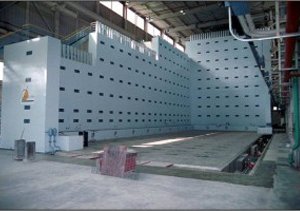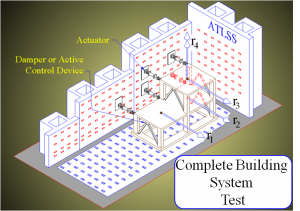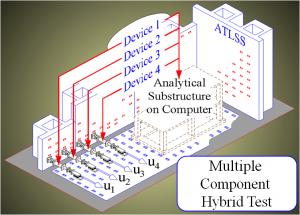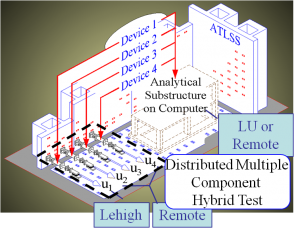To help meet the grand challenge of community resilience to natural hazards, the Natural Hazards Engineering Research Infrastructure (NHERI) Lehigh Experimental Facility (EF) was funded by the National Science Foundation (NSF) to be a world-class, open-access facility that enables researchers to address key research questions associated with the challenge of community resilience. The NHERI Lehigh EF has a unique portfolio of equipment, instrumentation, infrastructure, testbeds, experimental simulation control protocols, large-scale simulation and testing experience along with know-how that does not exist elsewhere in the United States. The unique strength of the NHERI Lehigh EF is accurate, large-scale, multi-degree-of-freedom and multi-directional simulations of the effects of natural hazard events on civil infrastructure systems (i.e., buildings, bridges, industrial facilities, etc.) with potential soil-foundation effects..
The types of laboratory simulations and tests enabled by the NHERI Lehigh EF include:
For a complete description of the EF, please review our Equipment, Facilities and Other Resources document.
Researchers are encouraged to take advantage of the existing research projects that provide potential payload project testbeds. All ongoing and newly funded projects at the NHERI Lehigh Experimental Facility are posted on the site's website to enable researchers to identify potential payload project opportunities (see the list of project links under Projects tab). Interested payload researchers should review the posted information for the ongoing/new project scope, schedule, and additional relevant information to determine feasibility of proposing a payload project. If additional project detail is required, payload researchers are encouraged to contact the project's PI directly to foster collaboration towards the project. The PI for each project is included in their descriptions on the site's website. The staff of the NHERI Lehigh Experimental facility can also provide assistance with contacting a project PI.
To establish a payload project, interested payload project researchers will need to follow the payload project protocol that is posted on the site's website (see Payload Project Protocol under Protocols section). Payload projects funded by the NSF are classified as an NSF-sponsored project. Usage Rates for NSF sponsored projects can be found at NSF Sponsored Projects User Fees. Usage Rates for non-NSF sponsored payload projects can be found at non-NSF Sponsored Projects User Fees.



